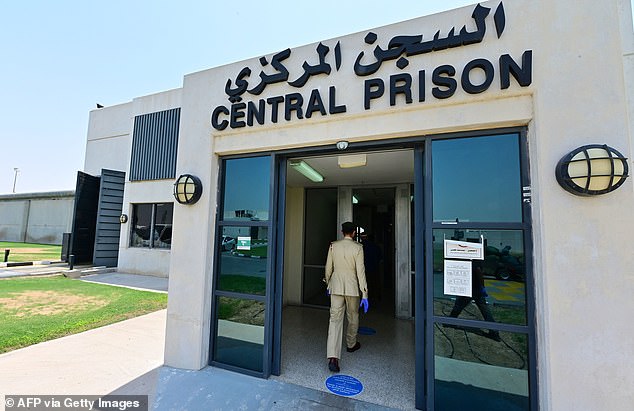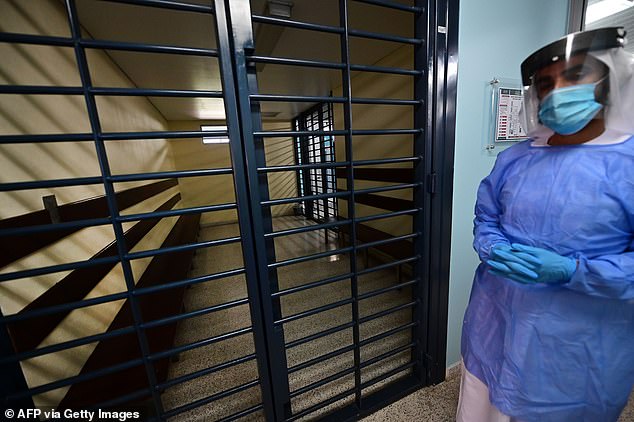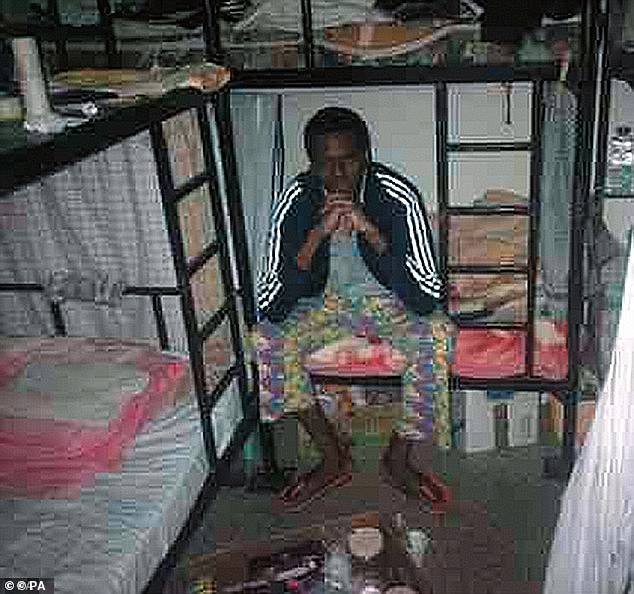Dubai’s prisons are notorious for their brutal conditions, with inmates crammed into overcrowded cells, tortured to extract confessions and suffering from horrific diseases.
Kilometers from the emirate’s famous beaches, in the middle of the desert, al-Awir central prison houses male and female criminals in separate buildings, and its inmates include murderers and terrorists.
Western tourists and expatriates, often without being charged or forced to confess to any crime, are locked up alongside dangerous criminals in unsanitary and cramped cells.
Rape is a “daily occurrence” in prison, according to a report earlier this year, with violent assaults carried out by both inmates and guards.
Now Irish flight attendant Tori Towey is facing… the prospect of being locked up in the facility after being accused of drinking alcohol and attempting to take her own life following alleged domestic abuse.
Here, MailOnline looks at harrowing accounts from former inmates who have shed light on the horrific conditions she and others detained in Dubai could face.
Karl Williams claims to have seen men torn apart by knife-wielding inmates, while others were forcibly infected with HIV during his time in Dubai’s hellish prison. Here he is pictured in his cell during the ordeal

Karl Williams has written about his prison experience in a new autobiography titled Killing Time. Here is a photo of one of the meals he was served

Tori Towey was stranded in Dubai after facing an attempted suicide charge
Karl Williams, a Briton who was jailed for a year in 2012, revealed in his memoirs how he watched men being stabbed to death, had his testicles electrocuted and feared being gang-raped by corrupt police.
He described how groups of guards stood by without intervening as inmates attacked each other: “I saw men stabbed in the neck and others slashed in the face. Blood splattered every surface as prisoner after prisoner was stabbed.”
He also said the prison was run by Russian gangsters, who used HIV-positive inmates to rape and infect others as a means of punishment.
Mr Williams, along with fellow Britons Grant Cameron and Suneet Jeerh, said they were given electric shocks and had guns pointed at their heads during their time in al-Awir.
“They pulled down my pants, spread my legs and began electrocuting my testicles,” Williams wrote.
“It was incredibly painful. I was so scared. I started to think I was going to die in that room.”
The men’s lawyers also claimed they were forced to sign documents in Arabic at gunpoint. Emirati police denied the allegations.
Prisoners at Al-Awir prison must have their heads shaved at all times upon entry and are punished if their hair grows, while women are reportedly required to keep their heads covered.
Punishments include being banned from watching television and making calls home, and access to the telephone is severely limited. Prisoners are rarely allowed visitors.
Several people share beds at a time, and up to 20 people share cells designed for three or four people.
Although many of the most notorious accounts of dire living conditions in recent years have been written by men, there are fears that the situation facing women is even more brutal.

A policeman enters Al-Awir Central Prison in Dubai, United Arab Emirates
Inmate Dinchi Lar said her jail had a minimum of 10 people for three bunk beds, meaning she was forced to sleep on the floor.
“There’s nothing like personal space… you’re sleeping and someone’s in front of you. You’re literally sleeping on top of someone else,” he told ITV.
Ms Lar said that for more than three months she was only able to go outside and “see the sun” for a period of 15 minutes.
Former British prisoner Zara-Jayne Moisey, who was locked up after reporting her own rape, has recalled the horrific conditions she was forced to live in at the filthy Al-Barsha prison.
“It was the most terrifying experience of my life, absolute torture, and all because I went to the police about what happened in the hotel room,” she told The Sun.
‘I will never forget prison, it is the worst place I have ever been.
“They left the lights off during the day so we could eat in total darkness. Then they turned them on at night so no one could sleep.”
Inmates have described both scorching heat and freezing temperatures with “extreme” air conditioning, with one saying: “If being in prison doesn’t destroy you, the temperature inside the prison will.”
Disease is also common in prisons: a former British inmate suffers from tuberculosis, which he contracted while there.

A doctor shows a corridor in the medical center of Al-Awir prison during the Covid pandemic
Human rights activists say some people with chronic health problems were denied adequate medical care.
A 2019 report found that HIV patients in al-Awir were denied life-saving treatment.
Cells were also invaded by Covid during the pandemic, with overcrowded conditions making social distancing impossible.
The illness is aggravated by freezing temperatures and lack of nutrition; photographs show the poor food served to inmates.
Ms Lar said inmates at her jail were not seen by a doctor unless they were “on the verge of death”.
Those who manage to escape from Dubai’s prisons are often scarred by their experiences.
Williams told the Press Association after his release: “When I came home I found it very difficult to adjust. I used to wake up in the middle of the night screaming and crying, not knowing why.
“I had mood swings, it must have been difficult for my family to be around me.”
He added: “I’m not sure why this happened to me. If I had known, I could have avoided the situation.”

